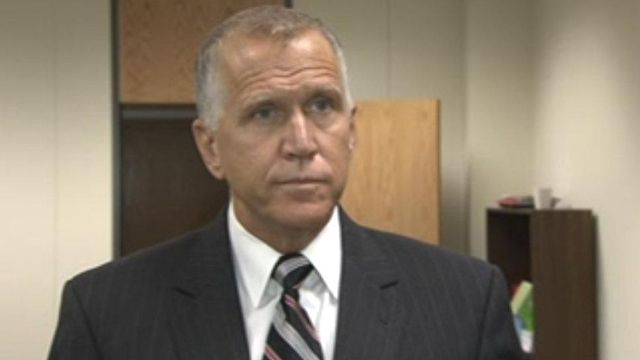Tillis, House leaders outline budget differences with Senate
After cancelling a planned Friday budget conference, House leaders spoke to reporters about differences between their plan and proposals by the Senate. Like Gov. Pat McCrory, they say the Senate cuts too much from other areas of government to pay for teacher raises.
Posted — UpdatedAfter all, the Senate's top budget writers said they were going home for the weekend and not show up.
Instead, House Speaker Thom Tillis, Budget Chairman Nelson Dollar and other senior budget writers made their case to reporters on Friday morning, laying out what they saw as the major differences between the two legislative chambers.
They also spoke about the potential of going home without a new budget agreement. While that wouldn't force a government shutdown – lawmakers passed a two year budget in 2013 that will continue to fund government operations through June 30, 2015 – it would go back on promises to raise teacher salaries made by Gov. Pat McCrory as well as House and Senate leaders.
The House, Senate and governor all have put forward plans that raise teacher salaries. But while McCrory and the House have suggested teacher pay raises of roughly 5 or 6 percent, Senate leaders have insisted on pushing for an 11 percent raise.
"We have said all along that teacher raises are the No. 1 priority of the Senate. We continue to have that as our No. 1 priority, and what we intend to do is continue to push for the most robust teacher raise we can," Senate President Pro Tem Phil Berger said Thursday.
But House leaders say that, in pushing for an 11 percent teacher raise, senators are pushing for a budget that would force drastic cuts to the state's Medicaid health insurance program for the poor and disabled, as well as cuts to funding for teaching assistants in second- and third-grade classrooms throughout the state. Senators have argued that research shows teaching assistants do not boost reading achievement in elementary school students.
House leaders have fought back, saying the Medicaid cuts, even if agreed to, would have to be approved by the federal government, which very well may reject such a drastic change to the state's entitlement programs. Tillis, Dollar and other budget writers point to testimony from principals, teachers and school superintendents who say teacher assistants are critical in managing elementary school classrooms. As well, some funding that lawmakers designate for teaching assistants actually goes toward paying teachers.
"Reductions can be productive. You can free up money through reductions," said Rep. Linda Johnson, R-Cabarrus, one of the chairmen of the House budget committee. "But we're at the point now where these reductions are going to be destructive."
"The funds are there and are available," Dollar, R-Wake, said of the 5 percent pay raise proposal.
There is no hard and fast deadline for lawmakers to adjourn their even-year "short" legislative sessions, although early hopes were to leave town before July 4. The lingering budget debate could have political consequences as well. Tillis, R-Mecklenburg, is a candidate for U.S. Senate, and the ongoing legislative session is keep him from being on the campaign trail full time.
Asked if his desire to go campaign could be influencing budget negotiations, perhaps allowing his Senate colleagues to apply extra pressure to get their way, Tillis said the state budget was "priority No. 1."
The campaign, he said, "has virtually no impact on anything we're doing here."
Related Topics
• Credits
Copyright 2024 by Capitol Broadcasting Company. All rights reserved. This material may not be published, broadcast, rewritten or redistributed.






